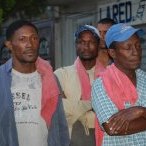
27 de julio de 2009 | Entrevistas | Agrocombustibles en Colombia | Derechos humanos
The color of land
length: 1:56 minutes
Descargar: MP3 (1.3 MB)
The Process of Black Communities in Colombia (PCN), which comprises over 80 African-Colombian organizations, was one of the networks calling the International Verification Mission on Agrofuels, where Real World Radio participated.
One of the leaders of the ethnical-territorial network, which is mainly based on the Pacific and the inter-Andean valleys, Naka Mandinga, described the process carried out by PCN and by other African organizations for a constitutional reform that enables the collective property of land by the communities.
This was later included under Law 70, of 1993, which provides the creation of the Community Councils, ethnical authorities on behalf of which collective property titles are delivered.
“These lands where the freed slaves settled down were declared empty lots, which means ’nowhere’s land’. This concept enabled many national and transnational corporations to come to these lands with the government’s permission to deplete the natural resources. We did not have a legal tool, even though we were the ancient owners of these lands. We don’t have a minimum tool now”, says Mandinga .
For the Afro-Colombians, he stressed “the essential thing is the link to the territory. People do not abandon the territory even if they are offered another place”.
Actually, the identity of this ethnical symbol has the name of Jorge Isaac Aramburu, “Mandinga” is his ethnical name from his African ancestors and in many Latin American countries it is used as a synomim of “evil”. During the interview, Naka reflected about the ideological use of the language as part of the colonizing process.
Photo: Jeanvieve Williams
Artículos relacionados
- Más desplazamientos
En Colombia desalojan a 123 familias de la Hacienda Las Pavas, en el municipio de El Peñón (Bolívar) pese a las solicitudes internacionales en contrario - Haciendo historia en el camino
Mientras recorremos el “mar de caña” de las inmediaciones de Palmira, en Cali Colombia dialogamos con Francisco Luna, dirigente cortero - Resistencia comunitaria
Entrevista a Liliana León, sobre la movilización para salvar el humedal de Timbique en el valle del Cauca, Colombia - En el mar de la caña
Entrevista a un productor de “La Pailita” en el Valle del Cauca, que resiste al monocultivo cañero en su zona








